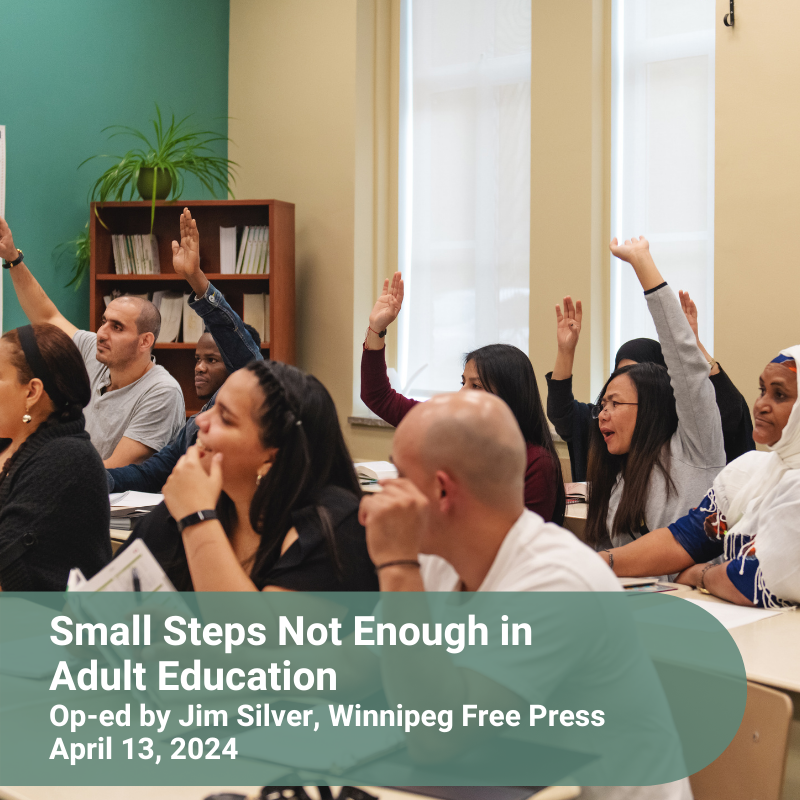Previously published in the Winnipeg Free Press Saturday April 13, 2024

It seemed for a moment as if adult basic education’s time had finally come. Premier Wab Kinew spoke publicly about its important role in moving people into the paid labour force; an Adult Literacy Act is in first reading; so too are legislative changes enabling people on Employment and Income Assistance (EIA) to pursue adult education and still receive benefits.
Then the budget came down.
Funding for adult basic education is to grow by less than 5 percent. This means adult basic education is still education’s poor cousin. Both K-12 and post-secondary education get far more per student; the cost of keeping an inmate in jail or prison is far more than the per student allocation to adult basic education. Funding has declined in real terms over the past two decades, despite the demonstrated need and the system’s established record of success.
By adult basic education I mean the Adult Learning Centres (ALCs) that offer the mature high school diploma, and the Adult Literacy Programs (ALPs) that bring adults’ literacy and numeracy skills up to high school entry level.
Literacy programs are needed because, according to the last count that I am aware of, which was done in 2013/14,192,600 Manitobans between the ages of 16 and 65 had literacy levels so low they were unable to participate fully in society.
Some ALCs have long wait lists of people wanting to earn their mature high school diploma. When ALCs have advertised in the past, they have been overwhelmed with applicants. Many Manitoba adults want to complete high school to get a decent job and support their families. They are being denied because governments will not invest in adult basic education.
Success rates in ALCs are high but are limited because of many years of cuts to funding. In 2019/20, the latest year for which annual reports are available, 922 adults graduated from ALCs. In years past these numbers were higher—1254 graduates in 2003/04, for example—but constant budget cuts have limited the numbers of graduates.
Most of those who graduate with their mature high school diploma will either join the labour force immediately or take training to further improve their skills and then enter the labour force. For many of these graduates, their experience in adult education is transformational. It changes their lives for the better.[MM1] Further, their children do better in school because their parents are role models for the importance of education.
Adult basic education also produces workers. Manitoba needs workers. Workers pay taxes. Investing properly in adult basic education would be paid back in increased tax revenues.
Importantly, Indigenous people are enrolled in adult basic education at a rate roughly two and a half times their share of Manitoba’s population. This makes adult basic education a part of the process of reconciliation, as well as an important anti-poverty measure.
There exists a detailed plan, based on extensive consultations with the Directors of ALCs and ALPs in all parts of the province, to build here in Manitoba the best adult education system in Canada. The benefits would be substantial, the costs minimal.
Yet governments appear unwilling to invest in preventative measures. For example, the continued failure of the Manitoba government to invest adequately in a range of anti-poverty measures has resulted among Canada’s provinces, Manitoba has the second highest rate of child poverty, and we still have more than 9000 children in custody of Child and Family Services.
Adult basic education is an economic horse that can pull these social carts. Instead, the new NDP government has chosen to continue starving this horse, even while cutting taxes almost all of which will benefit those with higher incomes.
Credit is due to the new government for a renewed Adult Literacy Act and for working to enable those on EIA to improve their education while continuing to receive benefits.
But bringing down a budget that increases adult basic education by a mere 5 percent is simply inadequate after decades of flatlined budgets that have meant constant cuts in real terms. If real problems are going to be solved, and if Manitobans’ real potential is going to be realized, this government is going to have to do a lot better.
………………….
Jim Silver is Professor Emeritus at the University of Winnipeg and a Research Associate with the Canadian Centre for Policy Alternatives-Manitoba. He is the author of Building the Best Adult Education System in Canada: A Roadmap and Action Plan for Manitoba.


